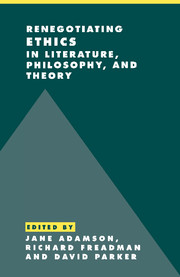Book contents
- Frontmatter
- Contents
- Introduction: the turn to ethics in the 1990s
- I ETHICS, LITERATURE, AND PHILOSOPHY
- II ETHICS AND AGENCY
- 5 What differences can contemporary poetry make in our moral thinking?
- 6 Moral luck in Paris: A Moveable Feast and the ethics of autobiography
- 7 The unseemly profession
- 8 The patient writes back
- III POLITICS AND ETHICS
- Index
6 - Moral luck in Paris: A Moveable Feast and the ethics of autobiography
Published online by Cambridge University Press: 04 February 2010
- Frontmatter
- Contents
- Introduction: the turn to ethics in the 1990s
- I ETHICS, LITERATURE, AND PHILOSOPHY
- II ETHICS AND AGENCY
- 5 What differences can contemporary poetry make in our moral thinking?
- 6 Moral luck in Paris: A Moveable Feast and the ethics of autobiography
- 7 The unseemly profession
- 8 The patient writes back
- III POLITICS AND ETHICS
- Index
Summary
Where there is most insight and reason, there is least luck; and where there is the most luck there is the least insight.
(Aristotle, the Eudemian Ethics)Hemingway's autobiographical volume A Moveable Feast begins (after preliminary scene-setting) with an image of adulterous desire and draws to a close with a lament to his betrayed wife and son. The first description is of a young woman whom Hemingway sees in a café:
I've seen you, beauty, and you belong to me now, whoever you are waiting for and if I never see you again, I thought. You belong to me and all Paris belongs to me and I belong to this notebook and this pencil.
(p. 6)At the end Hemingway is temporarily reunited with wife and child in the mountains:
When I saw my wife again standing by the tracks as the train came in by the piled logs at the station, I wished I had died before I ever loved anyone but her. She was smiling, the sun on her lovely face tanned by the snow and sun, beautifully built, her hair redgold in the sun, grown out all winter awkwardly and beautifully, and Mr Bumby standing with her, blond and chunky and with winter cheeks looking like a good Vorarlberg boy.
(p. 210)This chapter considers the ethical terms and implications of the narrative's passage from the inaugurating moment to its concluding statement of regret.
Autobiography, ethics, and luck
In the introduction to his classic autobiography World Within World, Stephen Spender foreshadows discussion of ‘certain moral problems’ and says that he has tried to ‘write of experiences from which I feel I have learned how to live’.
- Type
- Chapter
- Information
- Renegotiating Ethics in Literature, Philosophy, and Theory , pp. 134 - 160Publisher: Cambridge University PressPrint publication year: 1998

